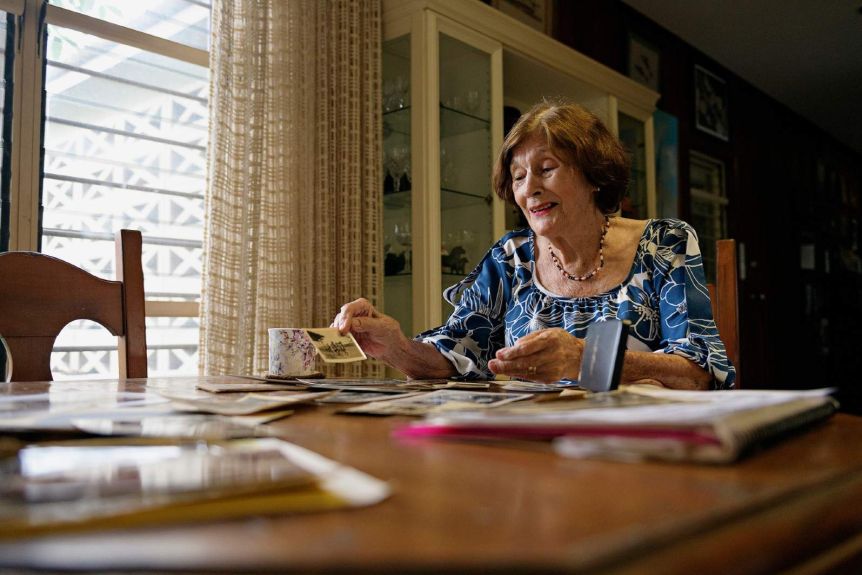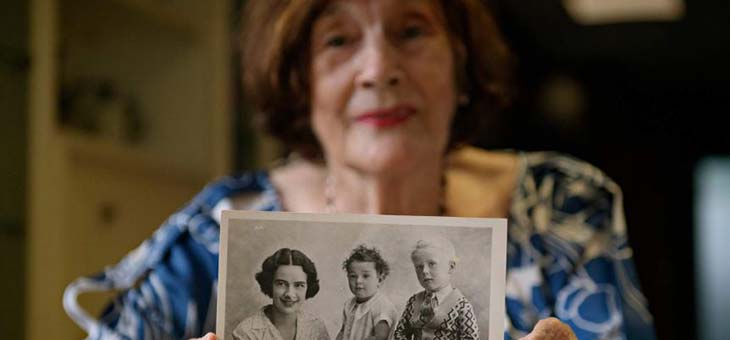Eighty-six-year-old Wendy James will never forget seeing the newspaper headline “Darwin bombed”, even though she was just six at the time.
Weeks earlier, she had waved goodbye to her father Stan Secrett on Stokes Hill Wharf, one of 2000 women and children who were evacuated from the then-remote Top End military outpost after the outbreak of World War II.
“We were left in a terrible state. We didn’t know if dad had been killed. No-one knew the death rate,” Mrs James said on the eve of the 79th anniversary of the Bombing of Darwin.
Australian war-time authorities kept many details of the attack secret at the time, deeming that disclosing casualties and damage would aid the enemy.
Three weeks after the first air raid on 19 February 1942, Mrs James’s family received a heavily censored letter where they were staying in Western Australia, revealing that her father was alive.
But Mrs James said it wasn’t until she was reunited with him three years later that she learned about his ordeal.
‘At first, he waved at them’
Mr Secrett, a construction supervisor, was working on Darwin’s Stokes Hill Wharf when the first planes struck at 9:58am.
“At first, he waved at them, thinking they were Americans,” Mrs James said.
“He started running with all the men he was working on the wharf with. They ran near oil tankers and tried to hide in one of the slit trenches, but they were all full.
Hundreds of servicemen and civilians were killed and countless others injured during 64 bombing raids on the Top End, the largest single attack ever mounted by a foreign power on Australia.
Mrs James told the ABC about some of the hardships endured by the Darwin women and children who were separated from their loved ones, most of them for the duration of the war.
The evacuation order for the women and children came around the time that Japanese planes attacked Pearl Harbour in December 1941.
It was those same planes, flying off Japanese aircraft carriers that attacked Darwin weeks later.
Mrs James remembers that her mother Poppy didn’t want to leave Darwin, then a military garrison town of dirt roads and areas of scrub.

She said air raid sirens were sounding when a military policeman threatened to carry her mother over his shoulder to the wharf if she refused to cooperate.
“We didn’t realise we wouldn’t see my father for three years,” Mrs James said.
The family boarded the Koolinda, a ship that had brought the family to Darwin a few years earlier.
Women on board took shifts to watch for Japanese submarines, planes or mines during the trip to Perth.
It was only later that Mrs James realised that the search lights she used to watch as she sat on the back step of the family’s railway house in Darwin with her brother, were actually searching for submarines.
‘He didn’t know how to talk to his children’
Mrs James said life in Western Australia was hard.
The government did not provide any food or accommodation, “so we moved from house to house.”
She stayed for a time at a boarding school in WA, after her mother went to live in Alice Springs, then a bustling war town like Darwin.
She said she spent most of the time in “silent introversion” looking up to the moon.
Mrs James re-joined her mother in Alice Springs about a year before peace was declared in 1945.
She remembers seeing people standing on top of trucks, blowing horns and cheering to celebrate the news.
By then her mother had given birth to twin boys after she had managed to be reunited at times with her father at Dunmarra Station, about 300 kilometres from Katherine.
After the war, the family returned to Darwin where they lived in one of the town’s pre-war Burnett houses, in what is now Mitchell Street, in inner Darwin.
The side of the shed in the garden had been blown away by a bomb.
Mrs James said while driving back to Darwin her father “didn’t speak to us… he didn’t know how to talk with his children.”
“We were eating plenty of arrowroot biscuits on the journey.”
Keen to return to Darwin
Mrs James said in Darwin, truckloads of people were preparing to leave, to return to their southern home towns.
But she said most Darwin people who had been evacuated were keen to return.
“They might’ve been living in tin sheds or terrible conditions, but they were like mum and wanted to come home no matter what is was like,” she said.
Mrs James remembers riding a bike past destroyed, damaged or looted houses.
“Being the age we were we just accepted it. A lot had been bombed but our school wasn’t and we were riding around there.”
Mrs James said she remembers seeing a woman crying because her house had been trashed.
“I guess it’s something about war,” she said.
Her father was killed in a road accident on the Stuart Highway when she was a teenager.
She has lived in Darwin for more than 80 years, seeing not only the damage caused by the Bombing of Darwin but also Cyclone Tracy in 1974, when she huddled in her home with her family.
Mrs James has received awards for her contribution to the Darwin community as well as an Order of Australia for her promotion of women’s issues.
These days she enjoys feeding birds in her tropical garden in the Darwin suburb of Fannie Bay.
“The birds I meet every morning at 7 o’clock… I have a conversation with them,” said Mrs James, as she gazed across her favourite bromeliads, philodendrons and calatheas.
The Bombing of Darwin Day Commemorative Service will be held at the Cenotaph on Darwin’s Esplanade, today, starting at 9:30am.
ABC Content Disclaimer
Do you remember the bombing of Darwin? Or do you recall your parents talking about it?

